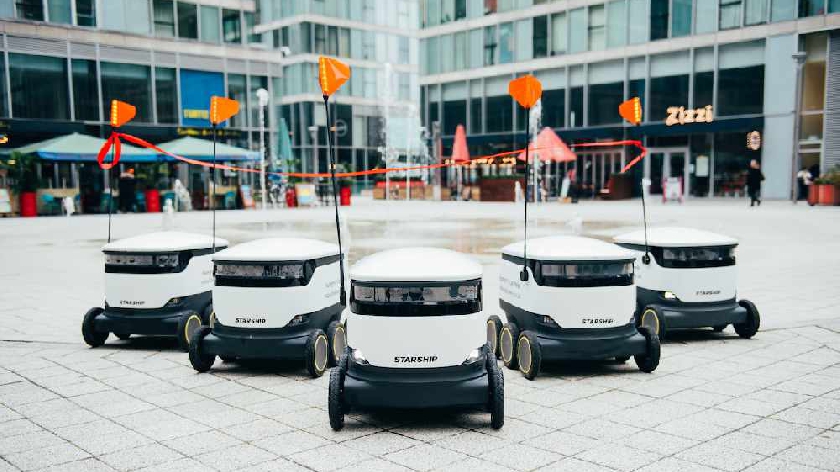Starship Technologies, one of the bigger names in the world of autonomous delivery robots — those little caboose-like, boxy delivery vehicles that self-drive around cities — has been on a roll during COVID-19, providing extra (unmanned) horsepower to distribute food and other goods between stores or restaurants and consumers, at a time when consumers were either reluctant or being ordered to stay at home to minimize the spread of the virus. Now it’s picking up some funding along with an endorsement in Europe to further its growth.
The startup has received €50 million (just under $57 million at today’s rates) from the European Investment Bank, the funding arm of the European Union. Starship Technologies is describing this as a “quasi-equity facility”, meaning there is a venture loan involved in the mix.
It is not disclosing its valuation with this investment, but Alastair Westgarth said that this doesn’t rule out raising further funding from investors. Starship raised a $40 million Series A led by Morpheus Ventures back in 2019, and last January, according to PitchBook, data also raised a further $17 million with strategic backers TDK Ventures (the investment arm of the Japanese electronics giant) and Goodyear Ventures among the investors. It has now made more than 2.5 million commercial deliveries (up from 2 million in October 2021) and travelled over 3 million miles globally. Westgarth said that on average, its fleet is making 10,000 deliveries per day.
Based out of San Francisco, Starship initially made its name, back in 2017, running pilots with delivery companies in the U.S. — DoorDash and Postmates (now part of Uber) — and then deployments in closed campus environments. Another robotic delivery startup, Marble, butted heads around that time with city regulators, and ironically the fallout of that is that Starship has yet to launch in its home city. (Marble is now owned by Caterpillar.)
It’s also had a significant presence in Europe, with its primary R&D operation based out of Tallinn, in Estonia (hence the financial endorsement from the EU), and its first substantial city deployment in Milton Keynes in the U.K. Prices for the service can vary by city and location, but as an example, a service that it provides to grocery chain Coop in Milton Keynes is made for a flat fee of 99 pence.
In the last two years, Starship’s name has been coming up a lot as a delivery partner helping companies get food orders to customers at a time when delivery drivers were in short supply, and people wanted to move around less and generally wanted less contact with humans. The Milton Keynes service alone saw hundreds of thousands of deliveries, and Starship started to sign on some significant partners. In the U.K., the list includes the grocery chains Tesco, Coop and Budgens, which partner with Starship primarily as a delivery vehicle not for its mega grocery stores, but for its centrally located, smaller-format shops, which act as “dark stores” stocking the items that Starship delivers to smaller radiuses around them. People order Starship deliveries via the startup’s iOS and Android apps.
Today the campus deployments are a majority of Starship’s business — some 70% — but the signs are pointing to a likely shift, Westgarth said.
“Grocery will be larger in a year to 18 months,” he said. The addressable market for campuses that would likely use Starship’s services is around 400-500, he said, “but grocery is billions of dollars. We are chasing delivery services around the world. We can deliver like anyone on a bike, scooter or car, but we’re cheaper, and our robots get cheaper each year.” The average battery life is 18 hours and a typical robot can travel around 40 km/day.
The company now operates its fleet as a level 4 autonomous system, meaning humans are monitoring at an operations center for issues, and can take over if a vehicle finds itself in an unexpected pickle, but that is not the default.
How autonomous delivery startups are navigating policy, partnerships and post-pandemic operations
“Ninety-nine percent of the time our robots have nobody involved. We make many deliveries without anyone involved,” Westgarth said.
The funding from the EIB ticks a couple of different boxes for the EU. First, it has been looking to promote more sustainable forms of transportation, both to reduce emissions and to reduce traffic on the roads. Second, it’s had a long-term goal of backing tech startups to further its standing in the digital economy.
“Electric vehicles in all shapes and sizes will be part of our future, and can be a key part in the sustainable transport puzzle,” said EIB VP Thomas Östros in a statement. “Starship’s delivery robots are already proving their worth, and we are glad to support the company so that they can continue to develop their technology and scale-up their production.”































Comment